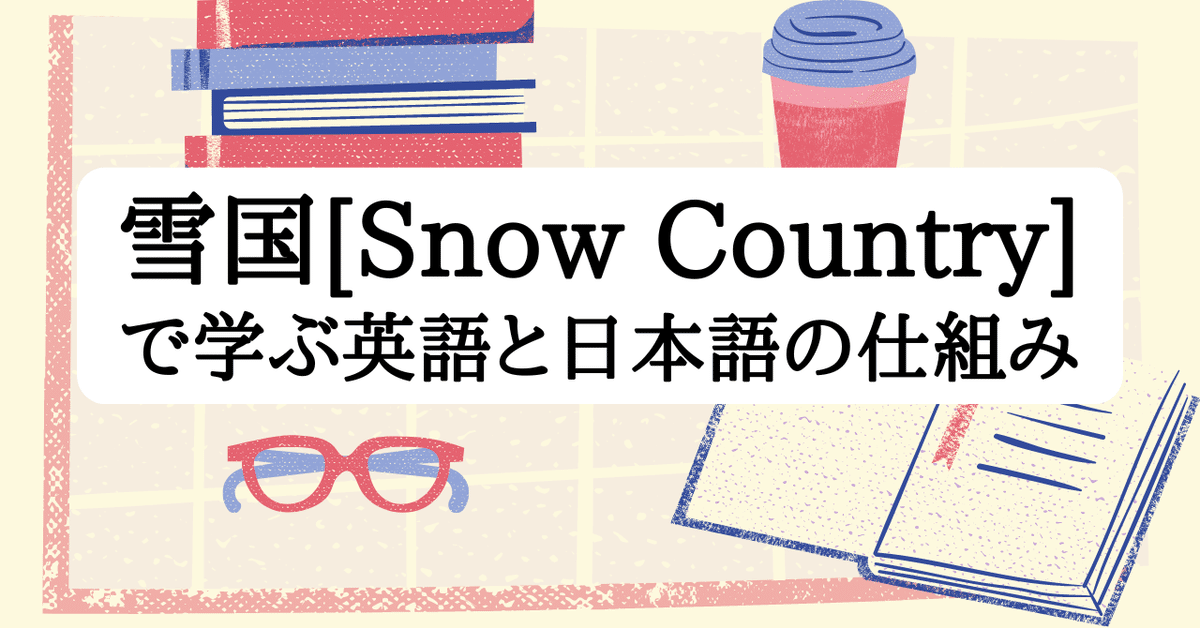
雪国[Snow Country]②:冠詞と代名詞の使い分け
「雪国」第二弾、名著の冒頭部分の和英比較と注目ポイントの解説を通して、英語と日本語の仕組みの違いを学んでもらいます。特に冠詞theとaの使い分け、冠詞と代名詞の使い分けを中心に解説します。
いわゆる学校英語や学術英語で整理しきれていない部分を面白いと思っていただけると幸いです(閲覧して面白いと思った方は、コメントしていただけると、教材や答え合わせを今後公開する励みになります)。
[タイトル]雪国 / Snow Country
[英文本文:最初から](「雪国[Snow Country]①」で紹介&解説済)
THE TRAIN came out of the long tunnel into the snow country. The earth lay white under the night sky. The train pulled up at a signal stop.
A girl who had been sitting on the other side of the car came over and opened the window in front of Shimamura. The snowy cold poured in. Leaning far out the window, the girl called to the station master as though he were a great distance away.
The station master walked slowly over the snow, a lantern in his hand. His face was buried to the nose in a muffler, and the flaps of his cap were turned down over his ears.
It’s that cold, is it, thought Shimamura. Low, barracklike buildings that might have been railway dormitories were scattered here and there up the frozen slope of the mountain. The white of the snow fell away into the darkness some distance before it reached them.
“How are you?” the girl called out. “It’s Yoko.”
“Yoko, is it. On your way back? It’s gotten cold again.”
“I understand my brother has come to work here. Thank you for all you’ve done.”
[以下、②続き](太字やカッコ内文章は私が入力)
「こんなところ、今に寂しくて参るだろうよ。若いのに可哀想だな」
“It will be lonely, though. This is no place for a young boy.”
「ほんの子供ですから、駅長さんからよく教えてやっていただいて、よろしくお願いいたしますわ」
“He’s really no more than a child. You’ll teach him what he needs to know, won’t you.”
※"a young boy"も"a child"も既出の弟"my brother"の描写ですが、どちらも不定冠詞が正解
※"won’t you."は"?"がついていないので付加疑問ではない点に注意
「よろしい。元気で働いてるよ。これからいそがしくなる。去年は大雪だったよ。よく雪崩れてね、汽車が立往生するんで、村も焚出しがいそがしかったよ」
“Oh, but he’s doing very well. We’ll be busier from now on, with the snow and all. Last year we had so much that the trains were always being stopped by avalanches, and the whole town was kept busy cooking for them.”
※"and all":"The Catcher in the Rye"で頻出することで有名
※"them"の先行詞は何?
「駅長さんずいぶん厚着に見えますわ。弟の手紙には、まだチョッキも着ていないようなことを書いてありましたけれど」
“But look at the warm clothes, would you. My brother said in his letter that he wasn’t even wearing a sweater yet.”
※"would you."も"?"ではないので付加疑問ではない点に注意
※My brother said in his letter that …"の主語はheでもいいように思える点は、前の記事「雪国[Snow Country]①:冠詞theとaの使い分け」❷❺で考察した問題と同じ。
「私は着物を四枚重ねだ。若い者は寒いと酒ばかり飲んでいるよ。それでごろごろあすこにぶっ倒れてるのさ、風邪をひいてね」駅長は宿舎の方へ手の明りを振り向けた。
“I’m not warm unless I have on four layers, myself. The young ones start drinking when it gets cold, and the first thing you know they’re over there in bed with colds.” He waved his lantern toward the dormitories.
("get cold"と"with colds"の使い分けに注意)
「弟もお酒をいただきますでしょうか」
“Does my brother drink?”
※ここの"my brother"も、やはりheでもいいように思える点は上と同じ。
「いや」
“Not that I know of.”
※中学で習う"No, he doesn't."と、ここで使われている"Not that I know of."のニュアンスの違いに注意
「駅長さんもうお帰りですの?」
“You’re on your way home now, are you?”
※ここの"are you"は"?"が続くので付加疑問
「私は怪我をして、医者に通ってるんだ」
“I had a little accident. I’ve been going to the doctor.”
「まあ。いけませんわ」
“You must be more careful.”
和服に外套の駅長は寒い立話をさっさと切り上げたいらしく、もう後姿を見せながら、「それじゃまあ大事にいらっしゃい」
The station master, who had an overcoat on over his kimono, turned as if to cut the freezing conversation short. “Take care of yourself,” he called over his shoulder.
今回のご紹介は以上です。
川端康成氏による原文とエドワード・G・サイデンステッカー氏による英訳(今回は特に英文での冠詞と代名詞の使い分け、和文と英文の細かいニュアンスの違い)、いかがでしたか?
以下をクリックして関連記事もご覧ください。
こうして名著をご紹介するついでに、原文を直接読んでもらえるようにリンクを貼ることにしました。以下のアマゾンサイトからKindle版(電子書籍)を無料で試し読みできますので、是非ご一読ください。
※Amazonのアソシエイトとして、適格販売により収入を得ています。気に入ったら購入もご検討ください。
Audible版はこちら
日本語原文はこちら(角川版と新潮版があります)
この記事が気に入ったらサポートをしてみませんか?
